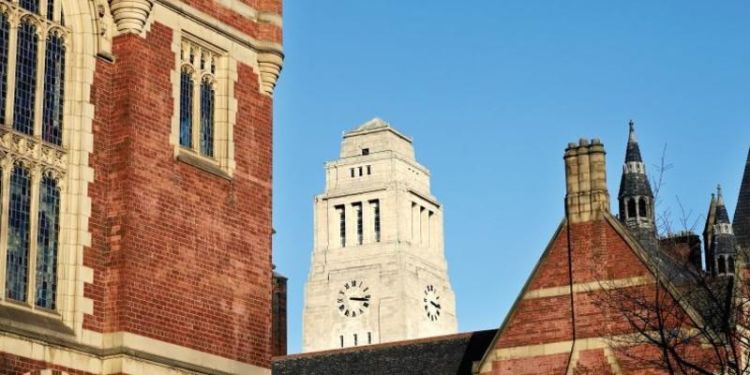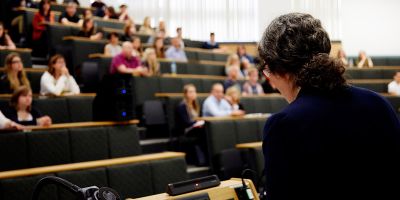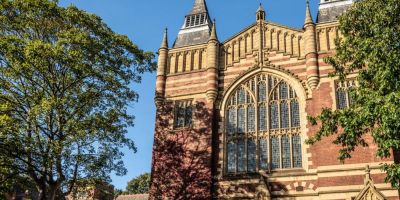Engaging Curriculum Redefined through the arts and humanities: working conversations on teaching, learning and assessment – Dr Eva Sansavior

Academic colleagues from across the Faculty together with students, community and industry partners are invited to contribute to reflective, cross-disciplinary dialogues which draw on shared examples of teaching, learning and assessment approaches.
Curriculum Redefined identifies disruptive and continuous change as defining features of the world facing graduates while also centring in its aspirations for a new curriculum the humanistic-constructivist values of meaningful student futures, research-informed, disciplinary-embedded teaching and learning, global citizenship, social justice and flourishing.
How might the distinctive pedagogies of the various arts and humanities disciplines grounded in research, practice, creativity, criticality, intercultural and ethical competence contribute to shaping this new values-led, global curriculum that continues to be anchored in the University’s longstanding civic commitments to transform its students, the city and region? And what is the potential sector-wide resonance of such a curriculum?
Taking as their starting point, Curriculum Redefined’s core pedagogic themes of Disciplinary Strength and Identity, Discovery, and Exploration (through interdisciplinarity), Authentic Assessment, Student Futures and Global Citizenship, these working conversations aim to offer a collegial and discipline-embedded context to support thinking and practice in teaching, learning and curriculum design.
Themes for discussion include:
-
What these pedagogic themes mean for specific disciplinary contexts and comparatively across arts-and-humanities disciplines as teaching, learning, research and practice.
-
How they are/might be articulated through the distinctive pedagogies of the arts and humanities, as forms of assessment and in relation to lived experience;
-
Why and how arts-and-humanities pedagogies matter for our students, community/industry partners and society;
-
How we make/might a case for their ‘value’ to our students, community/industry partners and society;
-
The role of module and programme descriptions, assessment approaches and learning outcomes.
Semester 2 - Assessment and Feedback and Wellbeing
Continuing from the conversations began last semester on disciplinary pedagogies and Global Citizenship in the Arts and Humanities, this semester’s connected conversations will explore, from both staff and student perspectives, the intersecting themes of assessment and feedback and approaches to supporting and cultivating student wellbeing.
Upcoming sessions aim to bring together academics and students and will include inclusive and fair assessment, digitally enabled, learning from feedback, supporting and cultivating student wellbeing in curricular and extra-curricular contexts, postgraduate assessment and feedback.
The University vision for assessment states:
‘Assessment at Leeds will be fair, inclusive and authentic and designed to support learning. Using digital technologies to deliver assessment and feedback practices and processes, we will ensure that assessment upholds academic standards and integrity whilst providing students with appropriate opportunities to demonstrate their potential and achievement’.
Reflective prompts for discussion:
-
How are these principles translated into specific disciplinary-informed approaches to assessment?
-
What do they mean for planning assessment and feedback as well as forms of feedback (formative and summative)?
-
To what and how extent are creativity and criticality assessed?
-
What is the role of broader values-led dimensions such as Global Citizenship and meaningful student futures?
-
And how is assessment and feedback experienced by staff and students?
-
How and to what extent do students learn from feedback?
-
What approaches do we take to supporting students’ wellbeing in the context of assessment and feedback?
-
And how are these experienced by students?
-
Beyond assessment and feedback, how is wellbeing understood and experienced by staff and students?
-
Are there specific disciplinary approaches to supporting and cultivating wellbeing?
Session 1, Authentic Assessment in the Arts and Humanities
Wednesday 8 March, 15:00 to 16:00 on Teams
What does authentic assessment mean in the arts and humanities? And how could it be implemented in the context of specific disciplines and programmes?
Ian Sapiro (Music) and Antonio Martinez-Arboleda (LCS) will be addressing these questions by way of practical examples of developing authentic assessment in their respective disciplines.
Join Teams meeting (Meeting ID: 314 968 140 550, Passcode: NqwP2U)
Session 2, Inclusive Assessment and Feedback in the Arts and Humanities – What is it and what could it be?
Inclusiveness is one of the core principles of the University’s assessment and feedback strategy, one that is supported by the Inclusive Baseline Standards.
How is this principle understood, translated and experienced in specific disciplinary teaching and learning contexts as both individual and collaborative academic practice? What are the opportunities as well as challenges presented and how are/might these (be) navigated?
Join Dr Andy Kirton, Lecturer in Applied Ethics (PRHS) and Dr Rachael Gillibrand, Lecturer in Inclusive Learning (History and English) for a conversation around inclusive principles and practices. In advance of the conversation, have your say about what inclusive assessment and feedback means for you via the Padlet.
Join Teams meeting (Meeting ID: 314 968 140 550, Passcode: NqwP2U)
Semester 1: Disciplinary Strength and Identity and Global Citizenship Pedagogies
6 sessions ran between 5 October and 15 December
What do Disciplinary Strength and Identity and Global Citizenship pedagogies mean for disciplines in the arts and humanities?
Six teaching and learning conversations featuring academics from a range of disciplines will explore this question through the lens of three key signature pedagogies of the arts and humanities: creative/critical reading, creative/critical writing and group discussion/dialogue.
Speakers will be invited to circulate, in advance, examples of module descriptions and/or student facing resources.
Readings will also be made available to participants.
These events took place online via the PRiA Teams Channel. Additional information about the Engaging Curriculum Redefined Working Conversations can be found on the Teams subchannel.
Session 1 and 2: Ways of reading – textual, digital, filmic, visual, musical, creative, critical, for research.
Wednesday 5 October 2022 and Wednesday 12 October 2022
What is the role of reading in your disciplines? And to what extent/how are disciplinary ways of reading taught explicitly to students (e.g., a guide to close reading and the use of Socratic questioning to elicit dialogue)? To what extent/how is reading described in written descriptions of modules/programmes?
How is reading assessed as skill/ as research/ as practice?
Session 3 and 4: Creative and Critical Thinking and Writing
Wednesday 19 October 2022 and Tuesday 25 October 2022
What is creativity? Can it be taught? How is creativity taught in your discipline? What is the role of Socratic questioning and group discussion?
What is the balance of creativity/criticality? Are these distinctions helpful? To what extent/how is creativity/criticality described in written descriptions of modules/programmes? How is creativity/criticality assessed?
Session 5: Group Discussion/Dialogue – The Spoken Exchange
Thursday 3 November 2022
What are the forms and role of spoken communication in your disciplines? In what contexts (e.g., tutorials, art crits, presentations, orals) and how are forms of dialogue taught? What approaches do you use to foster inclusive and equitable participation? To what extent/how is participation assessed? To what extent is participation in dialogue defined/described in written descriptions of modules/programmes?
Session 6: Global Citizenship
12 to 14 December 2022
What is global citizenship? How do arts and humanities pedagogies support students to develop intercultural competence/ ethical thinking/social justice sensibilities?
Speakers include:
- Dr Alessio Baldini, School of Languages, Cultures and Societies
- Dr Inês Bento Coelho, School of Fine Art, History of Art and Cultural Studies
- Dr Katie Carpenter, School of History
- Dr Ruth Daly, School of Performance and Cultural Industries
- Dr John Hammersley, School of Design
- Professor Hazel Hutchinson, School of English
- Dr Priyanka Verma, School of Languages, Cultures and Societies
- Dr Dibyadyuti Roy, School of Fine Art, History of Art and Cultural Studies
- Dr Alison Searle, School of English




